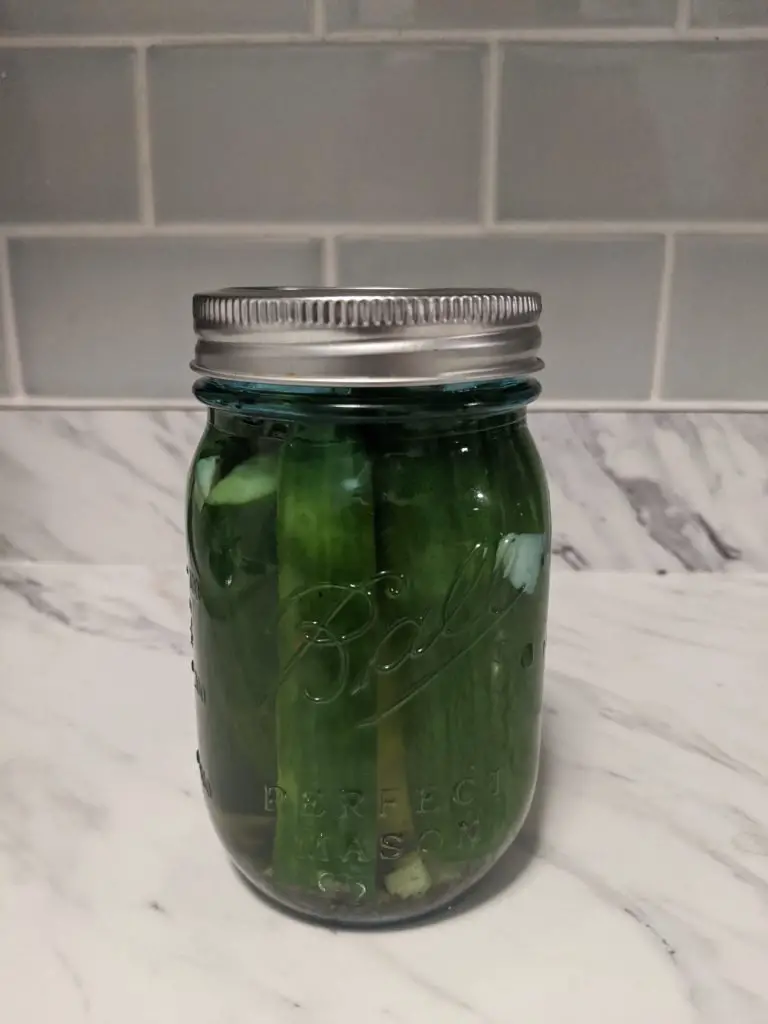Refrigerator pickles are typically the first type of pickles beginners make and for good reason. They are easier, and take less time, to make than their canned counterparts. For these reasons, this method is also used for experimentation with new recipes and ingredients
How do you make refrigerator pickles? To make pickles without canning, bring your brine to a boil and let cool it down to warm. Combine brine, spices, and cucumbers into a sterilized mason jar until brine covers cucumbers with a quarter inch airspace to lid. Close the lid tight and place into the refrigerator for at least 24 hours before consuming.
Washing containers, measuring ingredients and cucumber selection are all important pieces to making pickles. Read on for a recipe, guide, and more information on refrigerator pickles and what you need to know to make them delicious and safe.
How Do You Make Refrigerator Pickles?
Below is a recipe and guide for making refrigerator pickles.
| Component | Ingredient | Amount | Unit |
|---|---|---|---|
| Brine | Apple Cider Vinegar | 1 | Cup |
| Brine | Water | 4 | Cup |
| Ingredient | Dill | 1 | Sprig |
| Ingredient | Dill Seed | 1 | Tsp |
| Ingredient | Garlic Clove | 1 | Clove |
| Brine | Kosher Salt | 1 | Tbs |
| Ingredient | Kirby Cucumber Slices | As Needed | 16 oz Mason Jar |
| Ingredient | Black Peppercorns | 1/2 | Tsp |
Follow these steps below
- Place apple cider vinegar, water, and kosher salt into a pot and bring to a boil.
- Stir brine at boil to ensure salt is dissolved, then turn off heat and let cool during jar prep.
- Wash and dry 3 to 4 sixteen-ounce mason jars.
- Wash with cold water, then slice cucumbers into chips or spears.
- Brine will support 3 to 4 jars of pickles, so slice accordingly
- Combine dill, dill seed, garlic, and peppercorns (1 measurement per jar) into each mason jar.
- Pro Tip: instead of chopping garlic, put it through a press, this will release the oils and allow them to permeate quicker and easier into your pickles.
- At this time your brine should be warm to hot but not steaming. Pour it into the jars and leave a quarter inch of room to the lid.
- Brine should submerge all ingredients so don’t overfill your jars.
- Seal jars with a lid and place into fridge.
- Wait 24-72 hours and try your pickles. The longer you wait, the more flavor they will have.
Are Refrigerator Pickles Safe?
Refrigerator pickles are one of the most common pickles made at home in a non-commercial setting. They are known to be safer than fermented pickles as the salt and vinegar create an environment where bacteria can not thrive. This is why most pickles you purchase at the supermarket have vinegar in them. They are also pasteurized to be shelf stable without refrigeration, like brands such as Vlassic and Mt. Olive.
If made properly, refrigerator pickles are safe. Despite pickling being known as a preservation technique, refrigerator pickles can still spoil and should only be kept for two months maximum. No pickle is worth getting sick. They should also be kept in the fridge the whole time, but if you are putting them out during a meal for guests, that is fine as long as they are not in direct sunlight and go back into the fridge when you are done.

Are Refrigerator Pickles Healthy?
Refrigerator pickles are a low calorie, low fat, snack that contains fiber. Aside from garlic, the most common pickle spice, there are many different spices you can add to your pickles from cinnamon to turmeric. The benefits of these spices are vast and a pickle is a great way to work them in to your diet if you do not normally consume them.
The salt and spice content of pickle juice is often praised as helpful with hangovers and muscle cramps. This is partly due to the salt content, but strong spices such as garlic also contribute. Eating pickles should not be a replacement for electrolytes. If you regularly have cramps you may have an electrolyte deficiency in your diet and should seek out a doctor’s advice.
Are Refrigerator Pickles Better Than Fermented Pickles?
Since the two types of pickles offer a distinct flavor variance, there is no way to say if they are better. There are no probiotics in refrigerator pickles but they are more prolific and accessible to the general public. They also are generally safer than fermented pickles as they do not require as careful preparation and monitoring during the pickling process.
If you are just starting out making pickles, the refrigerator pickle is the first one you should start with. The relative quick turn around time allows you to test many flavors over a shorter period of time than the fermented variety. This is extremely helpful if you like spicy pickles, as everyone has a different level of heat thy enjoy and over time you will discover your own specific recipe that nails it.
